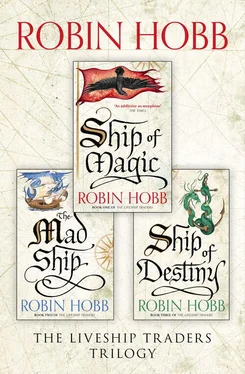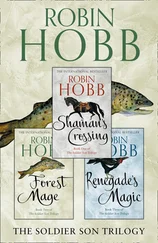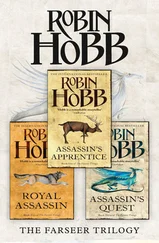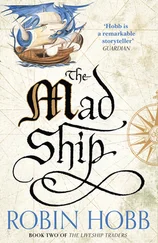Yet it was not any peculiar guilt at having stepped over dead men to claim this place and the responsibilities that went with it that bothered him tonight. No. It was the thought of Althea Vestrit, his benefactor’s daughter, curled in wet misery in the hold in the close company of such men as festered there. ‘There’s nothing I can do about it.’ He spoke the words aloud, as if by giving them to air he could make them ease his conscience. He hadn’t seen her come aboard in Bingtown; even if he had, he wouldn’t have recognized her easily. She was a convincing mimic as a sailor lad; he had to give her that.
His first hint that she was aboard had not been the sight of her. He’d glimpsed her any number of times as ‘a ship’s boy’ and given no thought to it. Her flat cap pulled low on her brow and her boy’s clothes had been more than sufficient disguise. The first time he’d seen a rope secured to the hook on a block with a double blackwall hitch rather than a bowline, he’d raised an eyebrow. It was not that rare a knot, but the bowline was the common preference. Captain Vestrit, however, had always preferred the blackwall. Brashen hadn’t given much thought to it at the time. A day or so later, coming out on deck before his watch, he’d heard a familiar whistle from up in the rigging. He’d looked up to where she was waving at the lookout, trying to catch his attention for some message, and instantly recognized her. ‘Oh, Althea,’ he’d thought to himself calmly, and then started an instant later as his mind registered the information. In disbelief, he’d stared up at her, mouth half-agape. It was her: no mistaking her style of running along the footropes. She’d glanced down, and at sight of him had so swiftly averted her face that he knew she’d been expecting and dreading this moment.
He’d found an excuse to linger at the base of the mast until she came down. She’d passed him less than an arm’s length away, with only one pleading glance. He’d clenched his teeth and said nothing to her, nor had he spoken to her since then until tonight. Once he had recognized her, he’d known the dread of certainty. She wouldn’t survive the voyage. Day by day, he’d waited for her to somehow betray herself as a woman, or make the one small error that would let the sea take her life. It had seemed to him simply a matter of time. The best he had been able to hope for her was that her death would be swift.
Now it appeared that would not be the case. He allowed himself a small, rueful smile, The girl could scramble. Oh, she hadn’t the muscle to do the work she was given. Well, at least not as fast as the ship’s first mate expected such work to be done. It wasn’t, he reflected, so much a matter of muscle and weight that she lacked; she could do the work well enough, actually, save that the men she worked alongside overmatched her. Even a few inches of extra reach, a half-stone of extra weight to fling against a block-and-tackle’s task could make all the difference. She was like a horse teamed with oxen; it wasn’t that she was incapable of the work, only that she was mismatched.
Additionally, she had come from a liveship — her family liveship, at that — to one of mere wood. Had Althea even guessed that pitting one’s strength against dead wood could be so much harder than working a willing ship? Even if the Vivacia hadn’t been quickened in his years aboard her, Brashen had known from the very first time he touched a line of her that there was some underlying awareness there. The Vivacia was far from sailing herself, but it had always seemed to him that the stupid incidents that always occurred aboard other ships didn’t happen on her. On a tub like the Reaper, work stair-stepped. What looked like a simple job, replacing a hinge for instance, turned into a major effort once one had revealed that the faulty hinge had been set in wood that was half-rotten and out of alignment as well. Nothing, he sighed to himself, was ever simple on board the Reaper.
As if in answer to the thought, he heard the sharp rap of knuckles against his door. It wasn’t his watch so that could only mean trouble. ‘I’m up,’ he assured his caller. In an instant he was on his feet and had the door opened. But this was not the mate come to call him to extra duties on this stormy night. Instead Reller stepped in hesitantly. Water still streamed down his face and dripped from his hair.
‘Well?’ Brashen demanded.
A frown divided the man’s wide brow. ‘Shoulder’s paining me some,’ he offered.
Brashen’s duties included minding the ship’s medical supplies. They’d started the voyage with a ship’s doctor he’d been told, but had lost him overboard one wild night. Once it had been discovered that Brashen could read the spidery letters that labelled the various bottles and boxes of medicines, he’d been put in charge of what remained of the medical stores. He personally doubted the efficacy of many of them, but passed them out according to the labels’ instructions.
So now he turned to the locked chest that occupied almost as much space as his own sea-chest did and groped inside his shirt for the key that hung about his neck. He unlocked the chest, frowned into it for a moment, and then took out a brown bottle with a fanciful green label on it. He squinted at the writing in the lantern’s unsteady light. ‘I think this is what I gave you last time,’ he guessed aloud, and held the bottle up for Reller’s inspection.
The sailor peered at it as if a long stare would make the letters intelligible to him. At last he shrugged. ‘Label was green like that,’ he allowed. ‘That’s probably it.’
Brashen worked the fat cork loose from the thick neck and shook out onto his palm half a dozen greenish pellets. They looked, he thought to himself, rather like a deer’s droppings. He’d have only been mildly surprised to discover that’s what they actually were. He returned three to the bottle and offered the other three to Reller. ‘Take them all. Tell Cook I said to give you a half-measure of rum to wash those down, and to let you sit in the galley and stay warm until they start working.’
The man’s face brightened immediately. Captain Sichel was not free with the spirits aboard ship. It would probably be the first taste he’d had since they’d left Bingtown. The prospect of a drink, and a warm place to sit for a time made the man’s face glow with gratitude. Brashen knew a moment’s doubt but then reflected that he had no idea how well the pellets would work; at least he could be sure that the rough rum they bought for the crew would help the man to sleep past his pain.
As Reller was turning to leave, Brashen forced himself to ask his question. ‘My cousin’s boy… the one I asked you to keep an eye on. How’s he working out?’
Reller shrugged. He jiggled the three pellets loosely in his left hand. ‘Oh, he’s doing fine, sir, just fine. He’s a willing lad.’ He set his hand to the latch, clearly eager to be gone. The promised rum was beckoning him.
‘So,’ Brashen went on in spite of himself. ‘He knows his job and does it smartly?’
‘Oh, that he does, that he does, sir. A good lad, as I said. I’ll keep an eye on Athel and see he comes to no harm.’
‘Good. Good, then. My cousin will be proud of him.’ He hesitated. ‘Mind, now, don’t let the boy know any of this. Don’t want him to think he’ll get any special treatment.’
‘Yes sir. No sir. Goodnight, sir.’ And Reller was gone, shutting the door firmly behind him.
Brashen shut his eyes and took a deep breath. It was as much as he could do for Althea, asking a reliable man like Reller to keep an eye on her. He checked to make sure the catch on his door was secure, and then re-locked the cabinet that held the medical supplies. He crawled back into the narrow confines of his bunk and heaved a heavy sigh. It was as much as he could do for Althea. Truly, it was. It was.
Читать дальше











